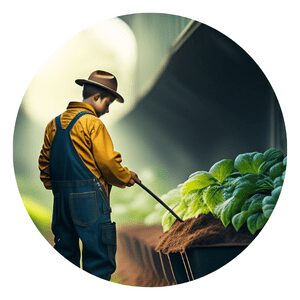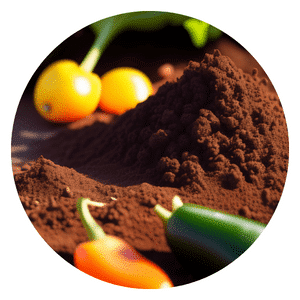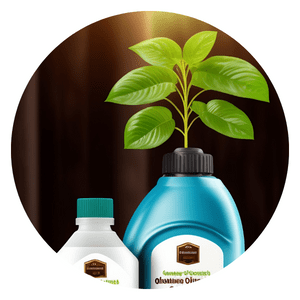How To Compost Pig Manure
Composting is an essential practice for sustainable farming and gardening, offering numerous benefits such as enriched soil, reduced waste, and improved plant growth.
While many individuals are familiar with composting kitchen scraps and yard trimmings, there is one often overlooked source of valuable organic matter – pig manure.
Pig manure is a nutrient-rich material that can be transformed into a high-quality compost that enhances the fertility and health of your garden or farm soil.
In this article, we will explore the step-by-step process of composting pig manure, highlighting key considerations to ensure successful decomposition and optimal use of this valuable resource.

Pig Manure Compost Menu
Collect the manure
Once you have collected the pig manure from the pens or holding areas, transfer it to a designated composting area. This can be a compost bin, pile, or even a designated spot in your garden.
It is important to choose a location away from water sources and any sensitive plants.
Before adding the manure to the composting area, it is recommended to mix it with other organic materials such as straw, leaves, or grass clippings. These additional materials will help create balance in the compost pile by providing carbon-rich elements that counterbalance the nitrogen-rich pig manure.
To ensure effective decomposition and odor control, it is crucial to turn and aerate the compost regularly using a pitchfork or shovel. This allows oxygen to penetrate into the pile and promotes microbial activity necessary for breaking down organic matter.
Additionally, monitoring moisture levels is essential; aim for a damp but not overly wet consistency throughout the composting process.
By following these steps and being mindful of hygiene practices during handling, you can successfully collect and begin composting pig manure at home while creating nutrient-rich soil amendments for your garden.
Mix with carbon-rich material
Mixing pig manure with carbon-rich materials is an essential step in composting pig manure effectively.
Pig manure contains high levels of nitrogen, which can lead to an imbalanced compost pile if not properly mixed with carbon-rich materials.
Carbon-rich materials, such as straw, dried leaves, wood shavings, or sawdust, help to provide a source of carbon for the microorganisms involved in the decomposition process.
When adding these materials to the compost pile, it’s important to maintain a 1:1 ratio between the pig manure and carbon-rich materials. This ratio ensures that there is enough carbon available to balance out the nitrogen content of the pig manure. Straw and dried leaves are excellent options due to their abundance and ease of availability.
Wood shavings or sawdust are also suitable choices as they can absorb moisture and help prevent odors from developing during the decomposition process.
By mixing pig manure with carbon-rich materials in a 1:1 ratio, you create optimal conditions for composting.
The addition of these materials helps regulate temperature and moisture levels within the pile while providing necessary nutrients for microbial activity. This balanced mixture will result in a rich and nutrient-dense compost that can be used as organic fertilizer for gardens or agricultural fields, promoting healthy plant growth without relying on synthetic chemicals or harmful substances.
Create compost piles
Creating compost piles is an essential step in effectively composting pig manure.
When choosing a location for your compost pile, it is crucial to select a well-drained area that allows excess water to drain away easily. This will prevent the pile from becoming waterlogged and help maintain the ideal moisture level for decomposition.
To begin building your compost pile, start by layering the pig manure with carbon-rich materials.
Carbon-rich materials can include items such as dried leaves, straw, sawdust, or shredded newspaper.
By alternating between layers of pig manure and carbon material, you create a balanced mix that promotes proper decomposition.
It is important to ensure that each layer of manure and carbon material is evenly distributed throughout the entire compost pile. This helps facilitate the breakdown of organic matter and encourages beneficial microorganisms to thrive within the pile.
Regularly turning or mixing the compost pile further aids in achieving proper mixing and enhances decomposition efficiency.
With these steps in place, you can effectively create compost piles using pig manure while maintaining an optimal environment for decomposition.
In soil's embrace, a garden thrives, Where organic treasures come alive; Compost enriches, a gift from swine, Pig manure dances with sun's shine. From earthy depths, green tendrils sprout, Vegetables flourish without a doubt; A symphony of nature's sweetest reward, Gardening heaven in my backyard.
Chappy The Gardener
Turn the pile
Turning the compost pile regularly is an essential step in composting pig manure.
By doing so, you can accelerate decomposition and prevent any unpleasant odors from developing.
Using a garden fork or shovel, carefully mix the materials to ensure proper aeration throughout the pile. This helps to introduce oxygen into the decomposing organic matter, creating an ideal environment for beneficial bacteria and microorganisms to break down the pig manure efficiently.
Ideally, you should turn the pig manure compost pile once every two weeks. This frequency allows for enough time for microbial activity to take place but prevents excessive cooling of the pile that could slow down decomposition.
As you turn the pile, make sure to mix both fresh pig manure and other compostable materials such as straw or leaves thoroughly. This ensures an even distribution of nitrogen-rich waste and carbon-rich material, which promotes balanced decomposition and produces nutrient-rich compost at a faster rate.
Regularly turning the pig manure compost also helps with moisture control.
When mixing the materials, check if there are any excessively wet areas that might need additional dry carbon-based materials like sawdust or shredded paper to balance out moisture levels.
Likewise, if certain parts of the pile appear too dry, consider adding some water during turning to maintain adequate moisture content for decomposition.
By consistently turning your pig manure composter every two weeks and maintaining proper moisture levels within it, you will be on your way to producing high-quality compost for your garden or plants.
Maintain moisture
Maintaining the right moisture level in a compost pile is crucial for the decomposition process.
If the pile becomes too dry, it can slow down or even halt microbial activity, which is essential for breaking down organic matter.
To ensure proper moisture, regularly check the compost pile by squeezing a handful of material. If it feels dry and crumbly, it’s time to add water.
However, caution must be taken not to overwater the pile either.
Excessive moisture can lead to anaerobic conditions and an unpleasant odor of rotting instead of a healthy decomposition process.
It’s important to strike a balance and aim for a moisture level similar to that of a damp sponge – moist enough that water can be squeezed out but not so wet that it drips.
To add water to the compost pile, use a watering can or hose with a spray nozzle attachment.
Water evenly across the entire pile while being mindful not to create puddles or overly saturate any specific areas.
Regularly monitoring and adjusting the moisture content will help maintain optimal conditions for microbes to thrive and break down pig manure efficiently into nutrient-rich compost for your garden.
Monitor temperature
One important aspect of composting pig manure is to monitor the temperature throughout the process.
As the composting process takes place, the pile will naturally heat up due to the activity of microorganisms breaking down the organic matter. This increase in temperature is a positive sign that decomposition is occurring effectively and efficiently.
It is crucial to aim for a specific temperature range during composting.
The ideal temperature for composting pig manure ranges between 130°F (54°C) and 150°F (66°C). This range provides optimal conditions for beneficial bacteria and other microorganisms to thrive, ensuring that organic materials are decomposed thoroughly.
Monitoring the temperature regularly allows you to ensure that it remains within this desired range.
Monitoring temperature not only indicates whether or not microbial activity is taking place but also helps identify any potential issues during the composting process.
If temperatures drop below 130°F (54°C), it may indicate insufficient microbial activity, which can be addressed by turning or aerating the pile to introduce more oxygen.
Conversely, if temperatures exceed 150°F (66°C), it could lead to excessive moisture loss or even spontaneous combustion, necessitating measures such as adding water or adjusting ventilation.
In conclusion, monitoring and maintaining an appropriate temperature during pig manure composting plays a vital role in facilitating effective decomposition.
Allow for decomposition
Allowing for decomposition is a crucial step in composting pig manure.
The process of decomposition involves the breakdown of organic matter by microorganisms, resulting in the formation of nutrient-rich compost.
The duration of decomposition can vary depending on several factors, including temperature and turning frequency.
Generally, it takes anywhere from 3 to 6 months for pig manure compost to fully decompose.
To ensure successful decomposition, it is important to monitor the compost regularly during this time. This involves checking the moisture levels and temperature within the pile.
Ideally, the moisture content should be around 50-60%, providing enough moisture for microorganisms to thrive but avoiding excessive wetness that can lead to anaerobic conditions and unpleasant odors.
Additionally, monitoring the temperature allows you to assess if microbial activity is occurring at an optimal level.
A desired temperature range is between 120-160°F (49-71°C), as this indicates active decomposition and helps kill weed seeds or pathogens that may be present in the manure.
Regularly turning or aerating the compost pile also aids in decomposition by introducing oxygen into the mixture. This process helps maintain aerobic conditions necessary for beneficial microorganisms responsible for breaking down organic matter effectively.
Turning also helps distribute heat evenly throughout the pile, ensuring consistent decomposition rates across all layers.
Mature the compost
To mature the compost, it is important to give it enough time to break down and fully decompose. This process typically takes several months to a year, depending on the conditions and materials used.
During this time, the compost pile should be turned regularly to ensure proper aeration and distribution of heat.
As the compost matures, it will gradually transform into a dark brown or black color. This indicates that the organic matter has broken down completely and is rich in nutrients.
The texture of mature compost should be crumbly and have an earthy smell. These characteristics are signs that the compost is ready for use in your garden or potting soil.
Adding mature compost to garden beds can greatly improve soil fertility by enriching it with organic matter and essential nutrients.
It helps retain moisture in the soil while also improving its structure, allowing better root development for plants.
Mixing mature compost with potting soil can enhance its nutrient content, providing a healthier environment for indoor plants or starting seeds.
Additionally, using mature compost as mulch around plants can help suppress weeds and prevent erosion while gradually releasing nutrients into the soil over time.
Use safety precautions
One important safety precaution to consider when composting pig manure is to avoid using fresh manure directly on edible crops, especially those that are consumed raw. This is because pig manure may contain pathogens such as E.
coli or Salmonella, which can pose a health risk if not properly handled and composted.
Instead, it is recommended to allow sufficient time for the composting process to take place, which helps in breaking down these pathogens and reducing their presence.
Allowing sufficient time for the composting process also ensures that the pig manure undergoes proper decomposition, resulting in nutrient-rich and safe compost that can be used on non-edible plants or incorporated into garden soil.
The ideal timeframe for composting pig manure varies depending on factors such as temperature, moisture levels, and turning frequency.
Generally, it is recommended to wait at least six months before using the compost to ensure any potential pathogens have been effectively eliminated.
In addition to waiting for adequate decomposition time, other safety precautions when handling pig manure include wearing gloves and protective clothing while working with it.
It’s also essential to wash hands thoroughly with soap and water after handling pig manure or any materials contaminated with it.
By following these safety precautions when dealing with pig manure during the composting process, you can minimize potential risks associated with pathogen exposure and create a safe environment for your plants.
Maintain good hygiene
When it comes to composting pig manure, maintaining good hygiene is of utmost importance. This means taking necessary precautions to protect yourself from any potential health risks associated with handling manure and working with the compost.
One essential practice is to always wash your hands thoroughly after coming into contact with pig manure or the compost pile. This simple act can prevent the transmission of harmful bacteria or parasites that may be present in the waste.
Additionally, it is crucial to avoid direct contact between your face and the manure or compost. This can be achieved by wearing protective gloves, masks, and goggles while handling these materials.
Inhaling dust particles from dry manure could lead to respiratory issues, so it’s important to take this precautionary measure seriously.
By being mindful of proper hygiene practices when working with pig manure and its resulting compost, you can ensure a safe and healthy environment for both yourself and those around you.
In conclusion, incorporating composted pig manure into organic vegetable gardening practices can yield numerous benefits.
It not only provides a rich source of nutrients for plant growth but also improves soil structure and promotes the growth of beneficial microorganisms.
Additionally, composting pig manure helps to reduce waste and environmental pollution while creating a sustainable and self-sufficient garden ecosystem.
By utilizing this natural fertilizer, gardeners can produce healthy and nutritious vegetables without relying on synthetic chemicals or harming the environment.
So why not give it a try and start composting pig manure for your own organic vegetable garden today?
Click To Grow
Helps Us Grow – Share If You Like
















